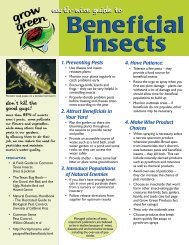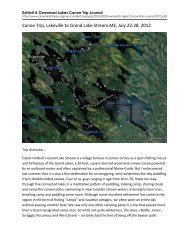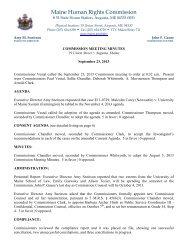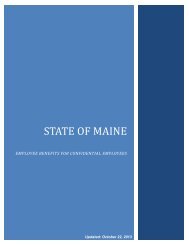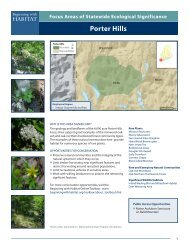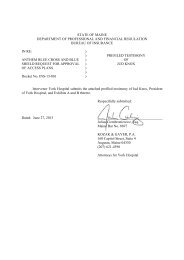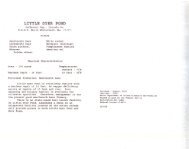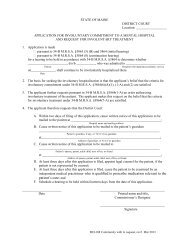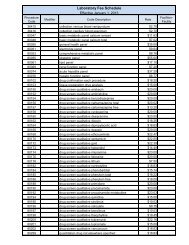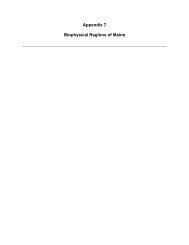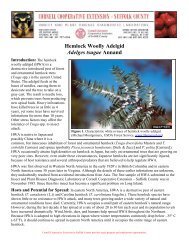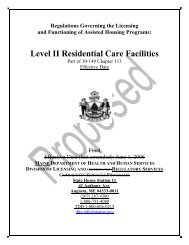SPILLS: CLEANUP & REPORTING - Maine.gov
SPILLS: CLEANUP & REPORTING - Maine.gov
SPILLS: CLEANUP & REPORTING - Maine.gov
Create successful ePaper yourself
Turn your PDF publications into a flip-book with our unique Google optimized e-Paper software.
…Introduction: TankSmart Operator Training • Class A/B Operators • Training Class C Operators • Annual UST System Inspections • Record Keeping • Spills: Cleanup & Reporting •<br />
Safety • Tanks: Double-Walled w/ Continuous Electronic Monitoring • Tanks: Double-Walled w/ Manual Monitoring • Tanks: Single-Walled • Daily Inventory & Statistical Inventory Analysis • Automatic Tank Gauges (ATGs) • Piping: Double-Walled<br />
Systems • Piping: Single-Walled Systems • Piping: Pressurized Pumping Systems • Piping: Suction Pumping Systems • Overfill Prevention: Ball Floats • Overfill Prevention: Electronic Alarms • Overfill Prevention: Drop-Tube Shutoff Valves • Spill<br />
Buckets • Cathodic Protection for Tanks & Piping • Stage I Vapor Recovery • Dispensers • Out-of-Service Tanks • Aboveground Storage Tanks (ASTs) • Heating Oil/Generator Tanks • Ethanol-Blended Gasoline •<br />
SpillS:<br />
Cleanup & RepoRting<br />
Spilled fuel from any source at your facility must be<br />
addressed immediately. All spills—even relatively small<br />
spills—can contaminate drinking water supplies as<br />
well as our lakes, rivers, and streams. Small, ongoing<br />
drips, for example, can add up to a lot of spilled fuel<br />
over time. Spills onto areas that are not paved, such as<br />
soil and gravel, are a particular threat to groundwater.<br />
There are many potential spill sources (e.g., during<br />
fuel delivery into the storage system, customers filling<br />
vehicles, dispenser leakage into soil, leaking hoses and<br />
nozzles). Facility operators need to be tuned in to all<br />
spill possibilities and know what to do if a spill occurs.<br />
Spill cleanup and reporting are top priorities.<br />
potential Spill SituationS<br />
Overfill spill into soil.<br />
No dispenser sump<br />
—drips go into soil.<br />
Spills to gravel.<br />
Spilled fuel from<br />
any source at your<br />
facility must<br />
be addressed<br />
immediately.<br />
Spill not cleaned up within 24 hours.<br />
Courtesy of Marcel Moreau Associates, Portland <strong>Maine</strong>.<br />
Module 6<br />
Page 1<br />
TankSmart: <strong>Maine</strong> UST Operator Training Program
TankSmart: <strong>Maine</strong> UST Operator Training Program<br />
…SPIllS: ClEAnUP & REPORTInG<br />
Do You Have emeRgenCY Spill-ReSponSe pRoCeDuReS?<br />
Your facility should have an emergency action plan that includes emergencyresponse<br />
procedures that describe the actions an operator must take should<br />
a spill occur. Be sure to review spill-response procedures for your facility<br />
periodically and ensure that all facility personnel are familiar with the action<br />
plan. If you have not yet established emergency procedures, NOW is a good<br />
time to do so.<br />
Spill-response procedures should include the following actions:<br />
Clean up all leaks, drips, and spills immediately<br />
Keep appropriate spill cleanup materials handy at all times<br />
Know who to contact (e.g., <strong>Maine</strong> DEP, fire department)<br />
Maintain a written log of ALL spills—what happened and what was<br />
done to clean them up<br />
Spill Cleanup<br />
If a spill occurs, take appropriate measures, such as turning off leaking<br />
equipment, to prevent further fuel flow, including drips. Use absorbent<br />
materials to soak up as much spilled fuel as possible. Never leave fuel-soaked<br />
materials laying around—they are a fire hazard. Fuel-contaminated soils and<br />
fuel-soaked materials should be stored temporarily outside in a closed metal<br />
container and disposed of properly.<br />
Speedi-dri and cat litter will release any soaked up oil if<br />
they become wet. These materials must be cleaned up as<br />
soon as any spilled oil is absorbed. They do not absorb a<br />
spill in the rain.<br />
Oil sorbent pads only soak up oil. They repel<br />
water and can be used to soak up spills even if<br />
it is raining or the spill occurs in a wet area.<br />
Module 6<br />
Page 2
Spill RepoRting<br />
…SPIllS: ClEAnUP & REPORTInG<br />
ALL <strong>SPILLS</strong> MUST BE REPORTED TO THE DEP! The DEP must be<br />
notified within 24 hours of discovery. The Spill Reporting Hotline is available<br />
24 hours a day, 7 days a week.<br />
Spill Reporting Hotline<br />
1-800-482-0777<br />
NOTE: There is one spill-reporting exception for UST facilities only:<br />
Surface spills of less than 10 gallons on a paved concrete or asphalt<br />
surface that do not reach groundwater or surface water and that are<br />
cleaned up within 24 hours. You can fulfill your reporting requirement<br />
for these spills only by recording them in your spill log.<br />
In all other cases, you must call the DEP to report a spill every time<br />
any amount of fuel is dripped, leaked, or spilled.<br />
Sample Spill log<br />
DATE<br />
DISCHARGE<br />
DISCOVERD<br />
UNDERGROUND OIL STORAGE FACILITY SPILL LOG OF DISCHARGES OF 10 GALLONS OR LESS WHICH<br />
WERE NOT REPORTED TO THE D.E.P.<br />
SOURCE OF DISCHARGE LOCATION OF DISCHARGE<br />
AT FACILITY<br />
DATE OF<br />
CLEAN-UP<br />
METHOD OF CLEAN-UP SIGNATURE OF<br />
OWNER<br />
OR MGR.<br />
IMPORTANT: Petroleum discharges ( spills) of 10 gallons or less do not have to be reported to the Department IF: (1) The spills<br />
are fully cleaned up within 24 hours, and: (2) A written log ( like the one above) of the spills is kept on file for the life of the facility.<br />
Note : This applies only to surface spills involving underground oil storage tanks. All other spills above 10 gallons, spills not<br />
associated with and underground oil storage facility, or evidence of a leaking underground oil storage facility must be<br />
reported to the Department of Environmental Protection within 24 hours of their occurrence.<br />
To report a leak or spill at any time, 24 hours a day, seven (7) days a week, call 1-800-482-0777<br />
Log Sheet #5<br />
All Spills<br />
Must Be<br />
Reported<br />
to the DEP!<br />
Spill<br />
Reporting<br />
Hotline<br />
800-482-0777<br />
Module 6<br />
Page 3<br />
TankSmart: <strong>Maine</strong> UST Operator Training Program



